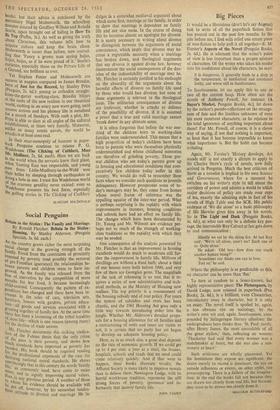Big Pieces
Ir would be a Herculean (don't let's say Augean) task to write of all the paperback fiction that has poured out in the past few months. In the pile before me, I find with relief one errant piece of non-fiction to help pull it all together—E. M. Forster's Aspects of the Novel (Penguin Books, 3s. 6d.). He is adamant that the writer's point of view is less important than a proper mixture of characters. Of the writer/who takes his reader into his confidence about his characters, he says: it is dangerous, it generally leads to a drop in the temperature, to intellectual and emotional laxity, and worse still to facetiousness.
To facetiousness: let me apply this to one or two of the current heap. How often are the novels of Anthony Powell, for instance (A Buyer's Market, Penguin Books, 4s.), let down by the author's pseudo-reflections on the strange- ness of fate and the limitless unknown of even his most recurrent characters, as he rejoices in his total ignorance of anything important about them? For Mr. Powell, of course, it is a clever way of saying, if not that nothing is important, at least that it has become impossible to know what importance is. But the habit can become irritating.
Again, Mr. Forster's 'History develops, Art stands still' is not exactly a dictum to apply to Sir Charles Snow's cycle of novels, now fully arrived in Penguins. Much the best criticism of Snow as a novelist is implied in his own Science and Government, where for a moment he switches on his writer's style to tell about the corridors of power and admire a world in which major decisions of policy are made over cups of tea, exactly the admiring style in fact of his novels of High Table and the SCR. His public embrace of 'We die alone' as a basic philosophy of life likewise gives him away in his novels. So in The Light and Dark (Penguin Books, 4s. 6d.), at what can only be a definite key pas- sage, the inscrutable Roy Calvert at last gets down to real communication :
Silently we sat by the dying fire. At last Roy said: `We're all alone, aren't we? Each one of us. Quite alone.
He asked: `Old boy—how does one reach another human being?'
`Sometimes one thinks one can in love.
`Just so,' he said.
Where the philosophy is as predictable as this, no character can be more than 'fiat?
To turn at random to a lesser-known, but highly representative piece: The Picturegoers, by David Lodge, now reissued in paperback (Pan Books, 2s. 6d.), is a brilliant, even Chaucerian, introductory essay in character, but it is only an essay. The novel itself is spoiled by, again, a too obvious eye on sociology, by the writer's own wit and, again, facetiousness, com- pounded by Salingersque literary allusions: the undergraduate hero thinks thus: 'St. Paul: surely, after Henry James, the most unreadable of all the great stylists,' then, reflecting on women: 'Thackeray had said that every woman was a matchmaker at heart, but she was also a mis- sionary at heart.'
Such criticisms are wholly piecemeal. Yet the limitations they expose are significant; the desire merely to record is dominant, the eye on outside influences or events, on other styles, too preoccupying. There is a failure of the imagina- tion: in the end the books fall not because they are drawn too closely from real life, but because they seem to be drawn too closely from it.
MALCOLM RUTHERFORD














































 Previous page
Previous page